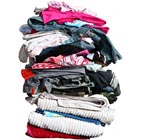Charity clothes smother local industry in East Timor
 Dili - It's no secret that charity clothes cast off from rich countries end up on the backs of some of the poorest people on earth. Supposedly, that's the whole point. But sometimes the best intentions go awry.
Dili - It's no secret that charity clothes cast off from rich countries end up on the backs of some of the poorest people on earth. Supposedly, that's the whole point. But sometimes the best intentions go awry.
The used clothing is often sold for low prices, undercutting local clothing industries. In Asia, used clothes are keeping dozens of vendors impoverished in one of the region's poorest countries while making a single company rich.
Indonesian entrepreneur Suyanto Tan opened Intelligent Yield Trading, a used clothing outlet, in 2000 in East Timor. From its cavernous warehouse in the capital, Dili, bales of used clothes make their way across the island of Timor.
At first, there was some competition, but according to Tan, his last rival closed in 2003. So for five years, a single company has been providing clothes for more than 1 million people. Local tailors are certainly no competition, thanks mostly to First World charity.
Armindo da Silva Soares, 46, is one of a handful of Timorese tailors left in Dili. He learned his craft after Indonesia invaded and took over East Timor in 1975.
"An Indonesian taught me," Soares said. "I paid him 50 dollars and bought a sewing machine."
During the Indonesian occupation, Soares ran a shop with 27 machines and 10 employees. But in the violence that has rocked East Timor since it voted for independence in a 1999 UN-sponsored referendum - first from exiting militias that torched about 70 per cent of the tiny nation's infrastructure and then in riots in 2006 between rival factions within the military and police - he has been burned out four times and has only three machines left.
He said he can no longer afford to pay any employees. The last straw was the 2006 riots, from which he said he has never recovered.
"We had lots of work until then," Soares said, "but after the crisis, all my employees left, and they got jobs somewhere else."
He sits alone in his shop surrounded by his family. Bolts of dark fabric hang on a fly-specked wall. His shop is in the middle of what used to be one of the largest markets in Dili, but it was razed in the riots two years ago. Even today, most of the neighbouring shops are still shuttered.
Outside his front window, he watches dust blow across rows of empty market tables. Skinny dogs lie in the deserted market streets. Yet it's not just the dead market that's driving away his customers. To even find Soares' shop, one must first navigate a tangle of used clothing stalls further up the street.
"The used clothing market is a big worry for us tailors," he said. "Those clothes are so much cheaper. They're all old, but they're cheap."
East Timor has never had a clothing factory, and because of charity clothes, it likely never will. Used clothing stalls have mushroomed around the city since 2006, largely because it's easier to sell used clothes than almost anything else.
"I used to sell vegetables and fried snacks, but in 2006, my stall was burned down," said Felicidade Gusmao, 50. "I lost my home and everything I owned."
Gusmao sits under the shade of shirts and pants while she waits for customers. She said her family scraped together some cash in 2007 and bought its first bale of used clothes from Intelligent Yield.
She doesn't make much money selling clothes - the shirts are a dollar each and the pants only slightly more - and she said she isn't able to save anything but she makes enough to get by.
"I can buy food and pay for what I need," Gusmao said.
She said she also always manages to have enough left over to make her monthly trip to Intelligent Yield for another bale of clothes.
The bales come in shipping containers delivered through an agent in Singapore. Intelligent Yield buys one container for about 2,000 dollars. This translates to about 18 dollars per bale, but Intelligent Yield sells the bales for around 150 dollars each.
When the ship comes in, it can sell more than 20 bales in a single day. In a country where the average income is less than 1 dollar per day, that translates to some serious income.
Gusmao said she hopes the bale she buys will contain good clothes. She picks over a pile of clothes that aren't so good. She's stuck with them. Because the bales are packed in the countries of origin, no one, not the clothing agent in Singapore or Intelligent Yield in East Timor, knows the quality of the clothes inside until they are opened by the vendors. There are no returns.
Often clothes are too big to fit on tiny Timorese bodies or they're just too worn. Gusmao puts them in a pile. At the end of a month, her family dumps them in a ditch across the street. When the rains come in a few months, the clothes will wash out to sea. The tides will bear away this unwanted charity. (dpa)